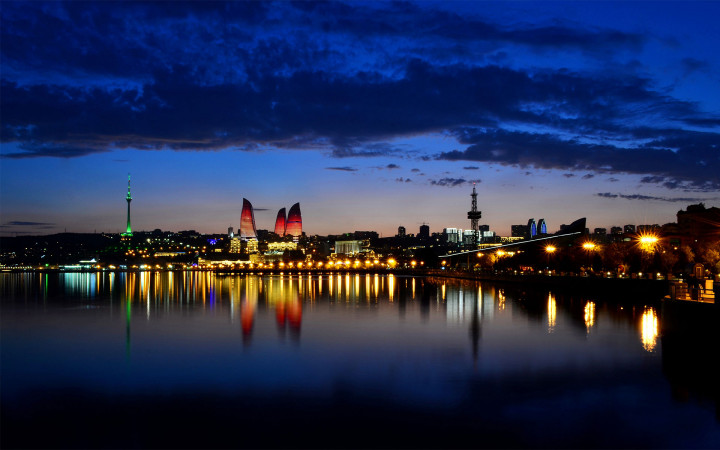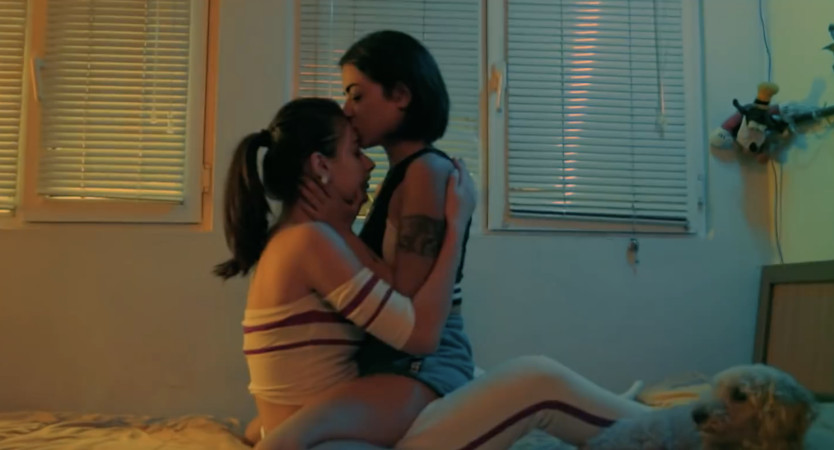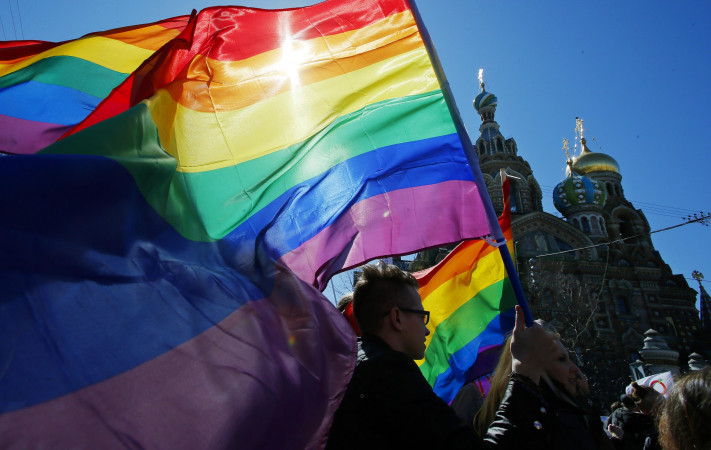LGBTQI+ situation in Azerbaijan — Will we lose the chains?
“Chains have a symbolic meaning: the government put chains on our neck” — Avaz Hafizli who chained himself the fences of the Prosecutor General's Office
02/Jan/24
4337
LGBTQI+ situation in Azerbaijan — Will we lose the chains?
“Chains have a symbolic meaning: the government put chains on our neck” — Avaz Hafizli who chained himself the fences of the Prosecutor General's Office.
Author: Vahid Aliyev
The year 2022 started with devastating news for the queer community in Azerbaijan: Avaz Hafizli, an LGBTQI+ rights defender and journalist, was murdered. According to the Prosecutor's Office, his cousin Amrulla Gulaliyev, who was under the influence of alcohol, fatally stabbed Hafizli during "a personal dispute." Activistswho visited the morgue said that Hafizli, a victim of a hate crime, had his throat slit and genitals mutilated.
The murder of Avaz Hafizli. What happened?
Avaz Hafizli, an LGBTQI+ rights activist and journalist in Azerbaijan, was murdered by his cousin Amrulla Gulaliyev on 22 February 2022. According to local LGBTQI+ rights activists, the murder was motivated by homophobic bias and to protect the "honour" of the family. The case was investigated and in July 2022, Gulaliyev was sentenced to nine years and six months by the Baku Court of Grave Crimes.
However, the court did not consider additional details of the murder, including the brutal circumstances of the killing and sexual mutilation of Avaz's corpse. Furthermore, LGBTQI+ activists were not allowed to attend the court proceedings. Gulaliyev was sentenced without any consideration of a biassed motive — Article 154 of the Criminal Code for violating Avaz Hafizli's constitutional rights and freedoms, as well as for the crime of murder with special cruelty or in a generally dangerous manner under Article 120.2.4, which would have resulted in a sentence twice as long.
I believe that the perpetrator's intention was to deprive Avaz Hafizli of life with special cruelty. Guleliyev stated in his testimony that he had decided to kill Avaz three months before the incident. I also believe that the perpetrator's actions towards the entire LGBTQI+ community, including subjecting Avaz to psychological pressure and torture, indicate special cruelty.
The government's failure to investigate and hold accountable those responsible for the "honour killing" and hate crime disregarded aggravating circumstances in determining the sentence. Avaz's murder followed social media influencer Sevinj Huseynova's incitement against sexual minorities and the trans community in Azerbaijan. This dangerous rhetoric, amplified by thousands of viewers, is seen as a contributing factor to Hafizli's tragic murder.
What is the current situation with the LGBT+ community and activism in the country?
According to LGBTQI+ rights activist Ali Malikov, the murder of Avaz Hafizli marked a turning point in the LGBTQI+ mobilisation efforts in Azerbaijan. As mentioned above, prior to his tragic murder, Hafizli had been instrumental in politicising the trans community in the country. With the leadership of Hafizli, the community, previously isolated within various political currents, found a renewed sense of purpose and unity in recent years. However, on the other hand, Hafizli's murder, coupled with the lack of accountability and justice, “had a profoundly negative impact on the emergence and politicisation of the LGBTQI+ community in Azerbaijan”.
“I remember there was a woman. She had her hand wrapped with a bandage and was trying to distribute halva in a tray. I asked what had happened, and they said she had been stabbed but didn't report it to the police because she knew what would happen,” says Ali Malikov.
The fear and apprehension experienced by LGBTQI+s in Azerbaijan became increasingly palpable in the aftermath of Hafizli's murder. The community, already focused on survival and staying alive, faced internal divisions and targeted harassment. This state-induced division aimed to suppress resistance and hinder the formation of a cohesive movement. Activists and individuals who previously stood up for LGBTQI+ rights found themselves marginalised and subjected to humiliation. The murder of Hafizli, whilst increasing visibility, inadvertently contributed to further divisions within the community.
“It is an interesting tendency of such a state to internally divide the community in order to suppress resistance in such situations. People get to know each other within the community, and I saw that there were people who humiliated us within the community, who targeted us and searched our homes.”
In Azerbaijan, as well as globally, the lives of LGBTQI+s are often reduced to private sexual preferences or problems to be kept behind closed doors to demobilise our communities.. Activists feel that their voices and experiences are being exploited and presented as insignificant. LGBTQI+s face challenges in all aspects of their lives, often resulting in homelessness and isolation. Activism in Azerbaijan struggles to gain traction because of the challenges to politicise our movement, and create spaces for LGBTQI+ ideas and social exchange. Visibility and awareness of LGBTQI+ rights are diminished, and our identities are used by state institutions for tokenistic purposes. The government selectively uses positive portrayals of the community or LGBTQI+ coded characters on TV or during Formula 1, whilst perpetuating violence and injustice against the community. In an atmosphere of fear, the queer movement faces limitations in achieving significant progress. Despite monitoring and documenting LGBTQI+ rights violations, collecting data about the situation for LGBTQI+s in Azerbaijan and organising discussions, our efforts are often restricted from reaching a wider audience. Even as our identities are reduced to "domestic issues" to be kept private, our actual privacy is constantly infringed upon, with intrusions into our phones and censorship of our online presence, leaving us unaware of who is behind such actions.
Despite facing oppression and obstacles, activism in Azerbaijan, particularly within the feminist and LGBTQI+ movements, remains resilient and committed to protecting resistance against the government, the police, the patriarchy. Activists continue to question society’s national and moral values and fight for what we believe is valuable. Over the years, there has been a noticeable increase in the number of people willing to join the cause — protection and promotion of LGBTQI+ rights —even if they cannot participate directly in street protests, for now. Activists now focus on leveraging media platforms to monitor, collect data, raise awareness, and foster visibility. However, the LGBTQI+ movement is still relatively inexperienced compared to other countries such as Turkiye, Georgia and others, with progress being measured in small, incremental steps. The emergence of resistance is promising, but the path ahead remains challenging, requiring perseverance and determination.
Trans rights activism in Azerbaijan:
“People are just afraid to engage in activism. I think this is somewhat rational, they are just afraid” — Vusala Hajiyeva, trans rights activist.
Trans rights activism in Azerbaijan faces several challenges that are interconnected. The foremost problem is the lack of human resources, as there are few trans activists in the country. However, this is not a coincidence as Azerbaijan has a totalitarian regime that seeks to suppress activism, especially that of the LGBTQI+ and feminist communities. The government's repression of activists instils fear amongst individuals who would otherwise be inclined to engage in activism. It is not difficult to understand why people are afraid given the potential consequences of being arrested. For example, in the course of writing this piece, three trans activists were detained as a form of intimidation and subsequently fined.
Whilst it is possible to participate in digital activism or organise closed events, the trans community in Azerbaijan cannot find jobs, and if they do, they merely work to survive. Engaging in activism requires time and dedication, which is difficult when one is struggling to make ends meet. The lack of financial resources is yet another challenge faced by the trans community in Azerbaijan. Very few organisations operate in the region and are willing to help, and even fewer are willing to work given the Azerbaijani government’s reputation for repressing activism.
Moreover, if one does find an organisation willing to help, there is no guarantee that they will receive financial support. The Azerbaijani government tightly controls all financial transactions, and receiving support from foreign organisations is often hampered by bureaucracy and suspicion. In one example of this dynamic, a small amount of money was sent to activist Vusala Hajiyeva from Georgia, but they could not receive it in their bank account. The government flagged it as a "suspicious transaction" despite the amount being relatively small.
The challenges faced by trans activists in Azerbaijan are multifaceted and interconnected. The government's repression of activism, the lack of human resources, and the overall lack of financial resources make it challenging for individuals to engage in activism and advocate for their rights. The trans community in Azerbaijan faces significant obstacles and must navigate complex bureaucratic systems in order to receive support from foreign organisations. In such a context, it is crucial to support the work of activists who bravely work to raise awareness about the issues faced by the trans community and fight for their rights.
To bring about change, there needs to be more significant attention and investment in the work of organisations that support trans activism in Azerbaijan. International organisations, civil society groups, and donor agencies can support the work of local organisations that operate in the country and promote activism. Furthermore, there is a need to create safe spaces for the trans community in Azerbaijan to discuss their issues and concerns. These safe spaces can serve as platforms for individuals to share their experiences and find support. This can be done through the creation of online forums, support groups, and outreach programs.
The impact of COVID-19 on the LGBTQI+ community:
The pandemic presented a new set of challenges as the community could not gather offline to organise events or discussions. However, as soon as the restrictions were lifted, civil society became more active and tried to make a difference. In the past year, the community has organised various events, including film screenings, song preparations, presentations, panel discussions, and more. While there are both positive and negative aspects to this, it shows that the community is making efforts to create a more inclusive and accepting society.
The current registration and licensing system in various fields of the economy, medicine, and other sectors do not have a fully inclusive approach towards LGBTI+s. This has caused difficulties for the community, particularly during the pandemic, as they face additional challenges in accessing economic and medical assistance from the state. For instance, those who work as sex workers and are not registered for taxation could not receive the same COVID-related aid as those with a Taxpayer Identification Number (TIN). Similarly, specific aid packages related to COVID for women and men, prioritising families and children, did not include the community.
Access to healthcare during the pandemic was a major concern for the LGBTQI+ community's right to health and well-being. They faced difficulties when hospitalised, including imposition of personal opinions, condemnation, and disclosure of personal information. The issue of ICU for LGBTQI+ community also arose, including how medical personnel and patients of different gender identities and sexual orientations would accept and adapt to them.
According to human rights defender Gulnara Mehdiyeva, the Azerbaijani government failed to take proper care of its citizens during the pandemic, with vulnerable groups like the LGBTQI+ community, women, people with disabilities, and the elderly suffering the most. She said: “Financial aid was only given in the amount of 190 manats for a period of three months, with specific rules in place that only allowed one parent to receive the payment for a family of four or more.”
The inadequate response of the government resulted in the most vulnerable groups, especially the LGBTQI+ community, being hit the hardest. According to Mehdiyeva, “LGBTQI+ community, particularly trans women, rely on sex work as their primary source of income, and during the pandemic, this was no longer a viable option.” Consequently, many were unable to pay rent and had to leave their homes. This was particularly difficult for those who lived in rented apartments as their families often did not accept them or requested they live separately. Along with economic issues, people were unable to leave their homes, socialise, and receive medical assistance and HRT. Even though the pandemic began a couple of years ago, the LGBTQI+ community continues to grapple with the aftermath and struggles to recover.
War in Ukraine:
“Redirection of foreign funds to Ukraine, affected the dynamics of activism in Azerbaijan” — Gulnara Mehdiyeva, human rights defender.
The war has had an indirect impact on us, rather than a direct one. The Azerbaijani LGBTQI+ community and organisations rely heavily on foreign donors for funding. These funds are used for various community building projects, educational initiatives, and retreats, among other things. However, when the war broke out, foreign donors naturally directed their funds towards Ukraine and the communities in Ukraine, which needed it the most. As a result, our community lost out on projects and funds for several months, which disrupted the dynamics of activism.
The impact was immediate. According to Mehdiyeva, Minority Azerbaijan, had won a 15-month project, but the donor could not finance it due to the redirection of funds towards Ukraine. “We survived for about eight months without any financial support,” as an impact of Russia invading Ukraine.
The second impact was the global economic events that took place as a result of sanctions and other economic policies towards Russia, which also indirectly or directly affected the economy of Azerbaijan. This has resulted in a significant increase in the prices of essential products, hygiene items, and rental apartments, among other things, almost doubling the amount for everything. This has had a significant impact on the community, especially those who have to survive on their own, without the support of parents or relatives. Finding work is also a challenge, as the community is not always accepted for who they are, their appearance, or gender expressions. The trans community faces even more significant challenges in this regard. In Azerbaijan, people are exploited in almost 90% of places where they work, regardless of their identities, according to local labour rights initiatives. They are forced to work long hours for little pay. The community is no exception, and they struggle to earn a decent wage.
Conclusion
In conclusion, the LGBTQI+ situation in Azerbaijan remains challenging and fraught with obstacles. The murder of LGBTQI+ rights activist Avaz Hafizli exposed the deeply entrenched homophobia and prejudice that persist within the country. Despite the conviction of Hafizli's cousin, the court failed to recognise the hate crime and the brutal circumstances of the killing. This lack of justice highlights the government's failure to fulfil its human rights obligations and provide a safe and inclusive environment for the LGBTQI+ community.
The LGBTQI+ movement in Azerbaijan, although resilient, faces significant barriers to progress. Fear, division, and targeted harassment have increased in the aftermath of Hafizli's murder, hindering the formation of a cohesive movement. The government's repression of activism and the lack of human and financial resources further complicate the situation, making it challenging for individuals to engage in advocacy and fight for their rights. The LGBTQI+ community also experiences discrimination and exclusion in various aspects of life, including employment, social security, and access to healthcare.
To address these issues and support the LGBTQI+ community in Azerbaijan, there is a need for increased awareness, support, and collaboration. International organisations, civil society groups, and donor agencies should provide support to local organisations and activists working on LGBTQI+ rights. Creating safe spaces for the trans community to discuss their concerns and experiences is crucial, along with leveraging media platforms to raise awareness and promote visibility.
Despite the difficulties, the LGBTQI+ movement in Azerbaijan continues to demonstrate resilience and commitment. Activists are actively working to challenge societal norms, raise awareness, and advocate for the rights of the community. While progress may be slow, the emergence of resistance and the increasing number of individuals willing to support LGBTQI+ rights is promising. However, sustained efforts, perseverance, and determination are required to overcome the existing barriers and achieve meaningful change in Azerbaijan.
***
Article translated for Queer Radar.
The article was published on July 10, 2023 on the website of the Tallinn-based international non-governmental organisation "ECOM" - Eurasian Coalition for Health, Rights, Gender and Sexual Diversity.
The translation into Azerbaijani belongs to the author Vahid Aliyev.
Powered by Froala Editor



